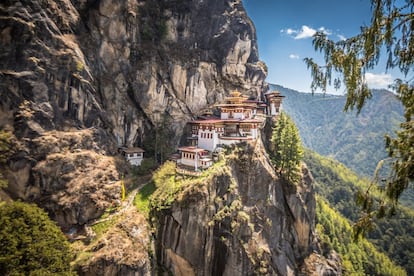New crypto-state emerges in the Himalayas: Bhutan has twice as many bitcoins as El Salvador
Bhutan is hoarding bitcoins as abundant and cheap electricity turn this remote and peaceful Buddhist corner of South Asia into the surprise epicenter of digital currency mining

A tiny nation squeezed between China and India deep within the Himalayas, Bhutan has become an unlikely cryptocurrency hub. The kingdom might be more accustomed to making the travel pages for its bucolic landscapes and Buddhist monasteries, but it has now leapt to the forefront of the cryptosphere after the firm Arkham Intelligence revealed that the state-owned conglomerate Druk Holdings owns 13,011 bitcoins, slightly more than double the amount declared by El Salvador’s Nayib Bukele (5,877). At current prices, this stash is valued at about $780 million, which for a population of about 780,000 inhabitants represents $1,000 in bitcoins per citizen.
Arkham explains that this small fortune comes from bitcoin mining operations carried out by Bhutan’s investment arm, the aforementioned Druk Holdings, a name that means “thunder dragon.” This dragon appears on the country’s flag, holding jewels as a symbol of wealth. “We were able to corroborate the chronology of the mining activity with evolving satellite images of the facilities’ construction,” Arkham notes. The largest of these infrastructures is located on the grounds of the failed Education City, with which the authorities sought to tackle emigration and reduce unemployment, but which has ended up housing bitcoin factories that are in operation 24/7 instead of classrooms and books.
“Unlike most governments, Bhutan’s bitcoins come not from law enforcement seizure of assets, but from bitcoin mining operations, which have increased dramatically since early 2023,” states Arkham. Bhutan now ranks fourth among those countries with the most bitcoins, trailing only the U.S., China and the U.K.
The details of Bhutan’s bitcoins became known this week, but the country’s intentions came to light some time ago. In such an inaccessible and remote corner of the world, it would not have been unusual for this information to remain under wraps for years as Bhutan’s authorities have been keeping their frenetic mining activity a secret. However, Forbes revealed the location of the facilities using satellite images after Bhutan’s ties to the crypto universe were exposed due to the bankruptcies of crypto lenders BlockFi and Celsius, with whom it had deposited small amounts.
Along with the bitcoins in their possession, the Bhutanese authorities also hold some $35 million in Ethereum — a decentralized blockchain and development platform — $3 million in BNB — the Binance token — and $20,000 in the Polygon blockchain platform.
One of the few pieces of information related to Bhutan’s mysterious crypto drift came to light in May 2023 when Singapore-based Nasdaq-listed Bitdeer Technologies explained in a statement that it had reached an agreement with Druk Holdings seeking $500 million in investment with which to develop green cryptocurrency mining. The country’s hydroelectric capacity, which allows it to obtain clean, abundant and cheap energy ideal for mining has given it a competitive edge. All it took was the chip and hardware imports to get the plan underway.
The end of the cryptowinter — as the period of low bitcoin prices has been dubbed — has also helped Bhutan realize its potential; it took more than a year to get back above $30,000 after the 2022 cryptocrisis, a figure less than half the high of $69,000 in November 2021. The $780 million worth of bitcoin is significant for a country with a GDP of around $3 billion, leading the Bhutanese government to consider selling a portion of its stockpile to finance wage increases.
Gross national happiness
While in El Salvador there has been some opposition to the government investing public money in bitcoins, public perception in Bhutan seems more favorable. A survey of business students run by the Universal Journal of Financial Economics in the country showed that 91% were aware of the existence of cryptocurrencies, and sentiment was overwhelmingly in favor.
But state investment strategy goes far beyond digital assets: it includes infrastructure, energy, and technology such as drones and data centers, not to mention physical mines to extract magnesium or graphene. The Asian Development Bank forecasts that Bhutan’s GDP will grow by 4.4% this year and soar by 7% in 2025.
Regarding Bhutan’s relationship with India, one of the two demographic giants that surround it, trade is a priority: exchanges of goods — excluding electricity — have almost tripled in a decade, from $484 million in 2014-15 to $1.6 billion in 2022-23, according to Indian government data, accounting for about 73% of Bhutan’s total trade. The Bhutanese enjoy better living conditions than their Indian neighbors, with a per capita income of $4,010 against $2,730.
The immersion in the crypto universe comes as a surprise, because the country has traditionally been more focused on spiritual issues than something as mundane as money. In the late 1970s, Jigme Singye Wangchuck, Bhutan’s fourth monarch, wanted to insulate his kingdom from the obsession with economic growth by coining an expression that would soon become synonymous with the calm, peaceful and pleasant life of its inhabitants. “Gross national happiness is more important than gross domestic product,” he said. Now, his heirs have transformed Bhutan into something more than a spiritual retreat, where money also matters.
Sign up for our weekly newsletter to get more English-language news coverage from EL PAÍS USA Edition
Tu suscripción se está usando en otro dispositivo
¿Quieres añadir otro usuario a tu suscripción?
Si continúas leyendo en este dispositivo, no se podrá leer en el otro.
FlechaTu suscripción se está usando en otro dispositivo y solo puedes acceder a EL PAÍS desde un dispositivo a la vez.
Si quieres compartir tu cuenta, cambia tu suscripción a la modalidad Premium, así podrás añadir otro usuario. Cada uno accederá con su propia cuenta de email, lo que os permitirá personalizar vuestra experiencia en EL PAÍS.
¿Tienes una suscripción de empresa? Accede aquí para contratar más cuentas.
En el caso de no saber quién está usando tu cuenta, te recomendamos cambiar tu contraseña aquí.
Si decides continuar compartiendo tu cuenta, este mensaje se mostrará en tu dispositivo y en el de la otra persona que está usando tu cuenta de forma indefinida, afectando a tu experiencia de lectura. Puedes consultar aquí los términos y condiciones de la suscripción digital.









































